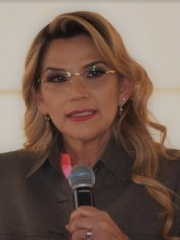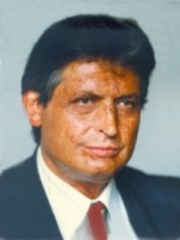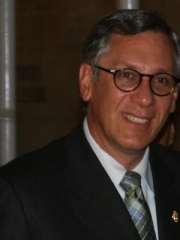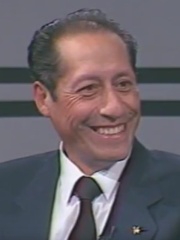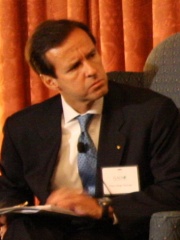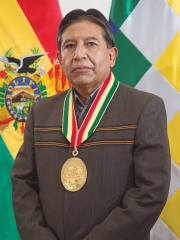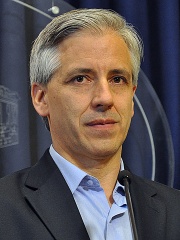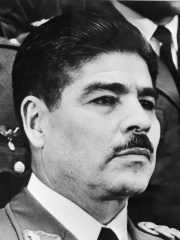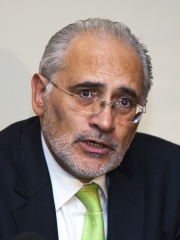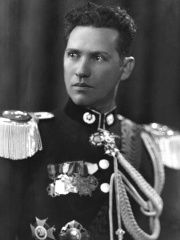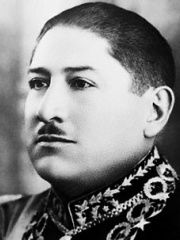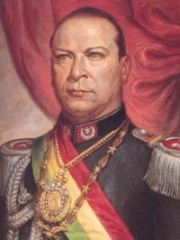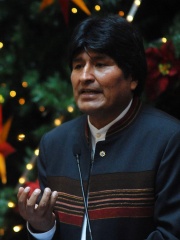
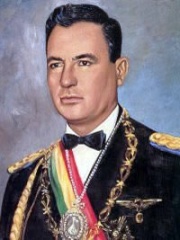
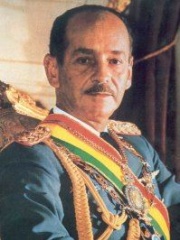
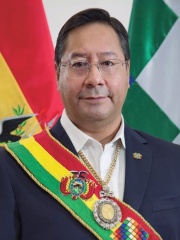
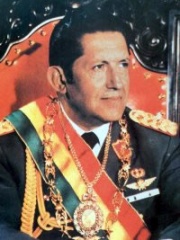
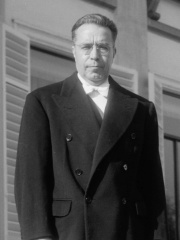
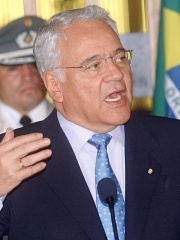
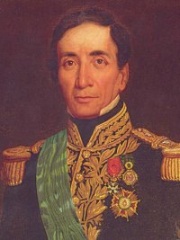
The Most Famous
POLITICIANS from Bolivia
This page contains a list of the greatest Bolivian Politicians. The pantheon dataset contains 19,576 Politicians, 56 of which were born in Bolivia. This makes Bolivia the birth place of the 61st most number of Politicians behind Tunisia, and Albania.
Top 10
The following people are considered by Pantheon to be the top 10 most legendary Bolivian Politicians of all time. This list of famous Bolivian Politicians is sorted by HPI (Historical Popularity Index), a metric that aggregates information on a biography's online popularity. Visit the rankings page to view the entire list of Bolivian Politicians.

1. Evo Morales (b. 1959)
With an HPI of 71.32, Evo Morales is the most famous Bolivian Politician. His biography has been translated into 103 different languages on wikipedia.
Juan Evo Morales Ayma (Spanish: [xwan ˈeβo moˈɾales ˈajma]; born 26 October 1959) is a Bolivian politician, trade union organizer, and former cocalero coca farmer who served as the 65th president of Bolivia from 2006 to 2019. Widely regarded as the country's first president to come from its indigenous population, his administration worked towards the implementation of left-wing policies, focusing on safeguarding the legal rights and improving the socioeconomic conditions of Bolivia's previously marginalized indigenous majority and combating the political influence of the United States and resource-extracting multinational corporations. Ideologically a socialist, he led the Movement for Socialism (MAS) party from 1998 to 2024. Born to an Aymara family of subsistence farmers in Isallawi, Orinoca Canton, Morales undertook a basic education and mandatory military service before moving to the Chapare in 1978. Growing coca and becoming a trade unionist, he rose to prominence in the campesino ("rural laborer") union. In that capacity, he campaigned against joint U.S.–Bolivian attempts to eradicate coca as part of the war on drugs, denouncing these as an imperialist violation of indigenous Andean culture. His involvement in anti-government direct action protests resulted in multiple arrests. Morales entered electoral politics in 1995, was elected to Congress in 1997 and became leader of MAS in 1998. He campaigned on issues affecting indigenous and poor communities, advocating land reform and more equal redistribution of money from Bolivian gas extraction. He gained increased visibility through the Cochabamba Water War and the Gas War. In 2002, he was expelled from Congress for encouraging anti-government protests, although he came second in that year's presidential election. Once elected president in 2005, Morales increased taxation on the hydrocarbon industry to bolster social spending and emphasized projects to combat illiteracy, poverty, and racial and gender discrimination. Vocally criticizing neoliberalism, Morales' government moved Bolivia towards a mixed economy, reduced its dependence on the World Bank and International Monetary Fund (IMF), and oversaw strong economic growth. Scaling back United States influence in the country, he built relationships with leftist governments in the South American pink tide, especially Hugo Chávez's Venezuela and Fidel Castro's Cuba, and signed Bolivia into the ALBA. His administration opposed the autonomist demands of Bolivia's eastern provinces, won a 2008 recall referendum, and instituted a new constitution that established Bolivia as a plurinational state. Re-elected in 2009 and 2014, he oversaw Bolivia's admission to the Bank of the South and CELAC. Morales' popularity was dented by attempts to abolish presidential term limits and disregard for a referendum rejecting a fourth term for Morales. Morales won the disputed 2019 election, but amid allegations of electoral fraud and the ensuing unrest, Morales agreed to calls for his resignation. He left Bolivia and was granted political asylum in Mexico initially and then Argentina during the presidency of Jeanine Áñez. He returned to Bolivia in November 2020, following the return of MAS to power upon the election of his former economic minister Luis Arce. During Arce's presidency, their relations deteriorated in the run up to the 2025 election in a power struggle for party influence and candidacy. Morales has blamed Arce for the 2024 Bolivian coup attempt (claiming it was a self-coup) and for an assassination attempt in October 2024, both of which Arce has denied. In February 2025, after MAS barred him from candidacy, Morales left the party to briefly join Front for Victory, before his membership was voided by the party and disqualified from participation in the election. The MAS would go on to face a historic defeat in the 2025 elections. Morales is permanently banned from running for presidency in future elections and also faces an arrest warrant in a statutory rape investigation on allegations of inappropriate relationships with minors. Morales' supporters point to his championing of indigenous rights, anti-imperialism, and environmentalism, and credit him with overseeing significant economic growth and poverty reduction as well as increased investment in schools, hospitals, and infrastructure. Critics point to democratic backsliding during his tenure, argue that his policies sometimes failed to reflect his environmentalist and indigenous rights rhetoric, and that his defence of coca contributed to illegal cocaine production.

2. René Barrientos (1919 - 1969)
With an HPI of 67.38, René Barrientos is the 2nd most famous Bolivian Politician. His biography has been translated into 34 different languages.
René Emilio Barrientos Ortuño (30 May 1919 – 27 April 1969) was a Bolivian military officer and politician who served as the 47th president of Bolivia from 1964 to 1965 and 1966 to 1969. During his first term, he shared power with Alfredo Ovando as co-president of a military junta and was the 30th vice president of Bolivia in 1964. General Barrientos came to power after the 1964 Bolivian coup d'état which overthrew the government of President Victor Paz Estenssoro. During his three-year rule, Barrientos and the army suppressed leftist opposition to his regime, including a guerrilla group led by Che Guevara in 1967. On 27 April 1969, Barrientos was killed in a helicopter crash near Arque, Bolivia. He may have been assassinated, but that has not been conclusively proven.

3. Hugo Banzer (1926 - 2002)
With an HPI of 66.38, Hugo Banzer is the 3rd most famous Bolivian Politician. His biography has been translated into 34 different languages.
Hugo Banzer Suárez (Spanish pronunciation: [ˈuɣo ˈβanseɾ ˈswaɾes]; 10 May 1926 – 5 May 2002) was a Bolivian politician and military officer who served as the 51st president of Bolivia. He held the Bolivian presidency twice: from 1971 to 1978 as a military dictator; and then again from 1997 to 2001, as a democratically elected president. Banzer rose to power via a coup d'état against socialist president Juan José Torres and repressed labor leaders, clergymen, indigenous people, and students during his 1971–1978 dictatorship. Several thousand Bolivians were either forced to seek asylum in foreign countries, arrested, tortured, or killed during this period, known as the Banzerato. After Banzer's removal via a coup led by Juan Pereda, he remained an influential figure in Bolivian politics and would run for election to the presidency via the ballot box on several occasions, eventually succeeding in 1997 via a narrow plurality of 22.26% of the popular vote. During Banzer's constitutional term, he extended presidential term limits from four years to five and presided over the Cochabamba Water War, declaring a state of siege in 2000 that suspended several civil liberties and led to violent clashes between demonstrators and law enforcement. After being diagnosed with lung cancer, Banzer resigned in 2001 and was succeeded by Vice President Jorge Quiroga.

4. Luis Arce (b. 1963)
With an HPI of 64.80, Luis Arce is the 4th most famous Bolivian Politician. His biography has been translated into 56 different languages.
Luis Alberto Arce Catacora (born 28 September 1963), often referred to as Lucho, is a Bolivian former politician, banker, and economist who served as the 67th president of Bolivia from 2020 to 2025. A member of the Movement for Socialism (MAS), he previously served as minister of finance—later minister of economy and public finance—from 2006 to 2017, and in 2019. Born in La Paz, Arce graduated as an economist at the University of Warwick. His lifelong career in banking and accounting at the Central Bank of Bolivia prompted President Evo Morales to appoint him as minister of finance in 2006. For over ten years as Morales' longest-serving minister, Arce was hailed as the architect behind Bolivia's economic transformation, overseeing the nationalization of the country's hydrocarbons industry, the rapid expansion of GDP, and the reduction of poverty. His tenure was only brought to an end by a diagnosis of kidney cancer, which forced him to leave office to seek treatment abroad. Upon his recovery, Arce was reappointed to his position in January 2019 but resigned from office within the year amid the social unrest within the country following the disputed 2019 election that culminated in Morales' resignation. During the interim government of President Jeanine Áñez, Arce sought asylum in Mexico and Argentina, where Morales—barred from running again—nominated him as the Movement for Socialism's presidential candidate in new elections scheduled for 2020. Arce characterized himself as a moderating force, a proponent of his party's socialist ideals (but not subservient to its leader, Morales) and won with 55% of the popular vote, defeating former president Carlos Mesa. Inaugurated in November 2020, Arce's presidency brought Bolivia back in line domestically and internationally with its positions under MAS leadership and away from the rightward shift of Jeanine Áñez's government. Domestically, Arce's first year in office saw success in combating the COVID-19 pandemic and stabilizing the economy during the pandemic's outbreak. His government spearheaded an international call for the pharmaceutical industry to waive its patents on vaccines and medications in order to provide greater access to them by low-income countries. The initial successes of Arce's government were eventually overshadowed by a socioeconomic crisis in Bolivia upon a shortage of foreign currency reserves beginning in 2023, exacerbated by decreased exports of natural gas and high inflation. Arce's presidency also saw him break with former president Morales, leading to a power struggle between both leaders for party influence and candidacy in the 2025 elections, leading to deadlock in the MAS-majority legislative assembly. In July 2024, an attempted coup against Arce took place in Plaza Murillo, with Morales accusing Arce of staging a self-coup due to declining popular support, followed by an assassination attempt against Morales in October 2024 that Morales claimed was orchestrated by the government, which Arce denied. Upon threats by Morales allies against family members of Supreme Electoral Court members and a bomb threat against the court, Arce's government has signaled intentions to prosecute Morales on charges of terrorism. Despite Morales stepping down as party leader of the MAS and Arce ultimately becoming the MAS nominee for re-election (with term-limits and legal challenges barring Morales' participation), unfavorable polling prompted Arce to renounce his bid for re-election in May and Eduardo del Castillo taking over the MAS ticket. Upon its fragmentation, the MAS would go on to have its worst electoral performance in history with del Castillo receiving only 3% of the vote, losing all seats in the Senate, and going from seventy-five to two seats in the Chamber of Deputies. Arce was succeeded by Rodrigo Paz in November 2025 and was expelled by the MAS upon leaving office.
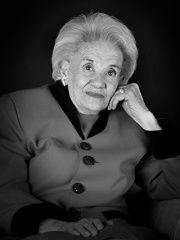
5. Lidia Gueiler Tejada (1921 - 2011)
With an HPI of 63.66, Lidia Gueiler Tejada is the 5th most famous Bolivian Politician. Her biography has been translated into 42 different languages.
Lydia Gueiler Tejada (28 August 1921 – 9 May 2011) was a Bolivian politician who served as the 56th president of Bolivia from 1979 to 1980. She was one of the first female republican heads of state and the first woman to serve as president of Bolivia.

6. Luis García Meza (1929 - 2018)
With an HPI of 63.46, Luis García Meza is the 6th most famous Bolivian Politician. His biography has been translated into 27 different languages.
Luis García Meza Tejada (8 August 1929 – 29 April 2018) was a Bolivian general who served as the de facto 57th president of Bolivia from 1980 to 1981. He was a dictator convicted of human rights violations and leader of a violent coup. A native of La Paz, he was a career military officer who rose to the rank of general during the dictatorship of Hugo Banzer (1971–78).

7. Víctor Paz Estenssoro (1907 - 2001)
With an HPI of 62.88, Víctor Paz Estenssoro is the 7th most famous Bolivian Politician. His biography has been translated into 36 different languages.
Ángel Víctor Paz Estenssoro (2 October 1907 – 7 June 2001) was a Bolivian politician who served as the 45th president of Bolivia for three nonconsecutive and four total terms from 1952 to 1956, 1960 to 1964 and 1985 to 1989. He ran for president eight times (1947, 1951, 1960, 1964, 1978, 1979, 1980 and 1985) and was victorious in 1951, 1960, 1964 and 1985. His 1951 victory was annulled by a military junta led by Hugo Ballivián, and his 1964 victory was interrupted by the 1964 Bolivian coup d'état. Paz Estenssoro's nephew Jaime Paz Zamora and grand-nephew Rodrigo Paz would go on to be the 60th and 68th presidents of Bolivia, respectively.

8. Gonzalo Sánchez de Lozada (b. 1930)
With an HPI of 62.73, Gonzalo Sánchez de Lozada is the 8th most famous Bolivian Politician. His biography has been translated into 34 different languages.
Gonzalo Daniel Sánchez de Lozada Sánchez Bustamante (born 1 July 1930), often referred to as Goni, is a Bolivian-American businessman and politician who served as the 61st president of Bolivia from 1993 to 1997 and from 2002 to 2003. A member of the Revolutionary Nationalist Movement (MNR), he previously served as minister of planning and coordination under Víctor Paz Estenssoro and succeeded him as the MNR's national chief in 1990. As minister of planning, Sánchez de Lozada employed "shock therapy" in 1985 to cut hyperinflation from an estimated 25,000% to a single digit within a period of less than six weeks. Sánchez de Lozada was twice elected president of Bolivia, both times on the MNR ticket. During his first term (1993–1997), he initiated a series of landmark social, economic and constitutional reforms. Elected to a second term in 2002, he struggled with protests and events in October 2003 related to the Bolivian gas conflict. According to official reports, 59 protestors, ten soldiers and sixteen policemen died in confrontations. As a result of the violent clashes, Sánchez de Lozada resigned and went into exile in the United States. In March 2006, he resigned the leadership of the MNR. The governments of Evo Morales and Luis Arce have unsuccessfully sought his extradition from the U.S. to stand trial for the events of 2003. Victims' representatives have pursued compensatory damages for extrajudicial killings in a suit against him in the United States under the Alien Tort Statute. In 2014, the U.S. District Court in Florida ruled the case could proceed under the Torture Victim Protection Act. The trial, which began on 5 March 2018 and concluded on 30 May 2018, found Sánchez de Lozada and his former defense minister Carlos Sanchez Berzaín not liable for the civilian deaths after the judge declared that there was "insufficient evidence". Nevertheless, on 3 August 2020, the 11th Circuit Court of Appeals vacated this ruling. On 5 April 2021, a separate U.S. District Court ruling reaffirmed a 2018 jury verdict which found both Sánchez de Lozada and Carlos Sanchez Berzaín liable and required them to pay $10 million.

9. Andrés de Santa Cruz (1792 - 1865)
With an HPI of 62.22, Andrés de Santa Cruz is the 9th most famous Bolivian Politician. His biography has been translated into 30 different languages.
Andrés de Santa Cruz y Calahumana (Spanish pronunciation: [anˈdɾes ðe ˈsanta ˈkɾuθ] ; 30 November 1792 – 25 September 1865) was a Peruvian-Bolivian general and politician who served as interim president of Peru in 1827, the interim president of Peru from 1836 to 1838 and the sixth president of Bolivia from 1829 to 1839. He also served as Supreme Protector of the short-lived Peru-Bolivian Confederation from 1836 to 1839, a political entity created mainly by his personal endeavors.
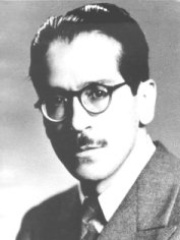
10. Hernán Siles Zuazo (1914 - 1996)
With an HPI of 61.02, Hernán Siles Zuazo is the 10th most famous Bolivian Politician. His biography has been translated into 26 different languages.
Hernán Siles Zuazo (21 March 1914 – 6 August 1996) was a Bolivian politician who served as the 46th president of Bolivia twice nonconsecutively from 1956 to 1960 and from 1982 to 1985. He also briefly served as interim president in April 1952, and as the 27th vice president of Bolivia from 1952 to 1956.
People
Pantheon has 56 people classified as Bolivian politicians born between 1759 and 1967. Of these 56, 10 (17.86%) of them are still alive today. The most famous living Bolivian politicians include Evo Morales, Luis Arce, and Gonzalo Sánchez de Lozada. The most famous deceased Bolivian politicians include René Barrientos, Hugo Banzer, and Lidia Gueiler Tejada.
Living Bolivian Politicians
Go to all RankingsEvo Morales
1959 - Present
HPI: 71.32
Luis Arce
1963 - Present
HPI: 64.80
Gonzalo Sánchez de Lozada
1930 - Present
HPI: 62.73
Jeanine Áñez
1967 - Present
HPI: 60.26
Jaime Paz Zamora
1939 - Present
HPI: 59.25
Eduardo Rodríguez
1956 - Present
HPI: 56.70
Guido Vildoso
1937 - Present
HPI: 56.36
Jorge Quiroga
1960 - Present
HPI: 54.71
David Choquehuanca
1961 - Present
HPI: 52.93
Álvaro García Linera
1962 - Present
HPI: 52.10
Deceased Bolivian Politicians
Go to all RankingsRené Barrientos
1919 - 1969
HPI: 67.38
Hugo Banzer
1926 - 2002
HPI: 66.38
Lidia Gueiler Tejada
1921 - 2011
HPI: 63.66
Luis García Meza
1929 - 2018
HPI: 63.46
Víctor Paz Estenssoro
1907 - 2001
HPI: 62.88
Andrés de Santa Cruz
1792 - 1865
HPI: 62.22
Hernán Siles Zuazo
1914 - 1996
HPI: 61.02
Juan José Torres
1920 - 1976
HPI: 60.58
Carlos Mesa
1953 - Present
HPI: 60.28
Germán Busch
1903 - 1939
HPI: 59.18
Enrique Peñaranda
1893 - 1969
HPI: 58.57
Gualberto Villarroel
1908 - 1946
HPI: 58.48
Overlapping Lives
Which Politicians were alive at the same time? This visualization shows the lifespans of the 25 most globally memorable Politicians since 1700.

